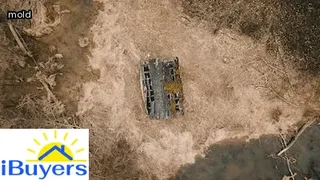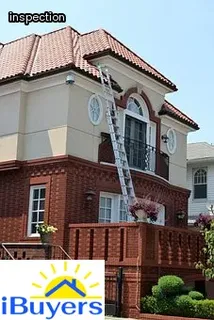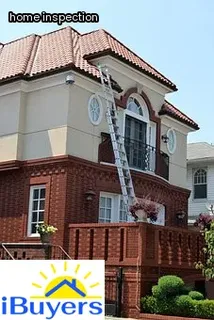Mold contamination is the presence of mold in a home. It is an environmental hazard that can cause a variety of health problems and can damage the structure of a house.
Mold can be caused by high moisture levels, leaks or flooding, and poor ventilation. It often grows in damp places such as basements, crawl spaces, and bathrooms where it can thrive in the humid air.
Areas with mold contamination may have a musty smell or visible signs of mold growth such as dark spots on walls, furniture, carpeting, or other surfaces. Mold spores are microscopic and can easily spread through air circulation systems.
If left untreated, mold contamination can spread throughout the home quickly and cause major damage to both its structure and its inhabitants’ health.

Mold exposure can be hazardous to your health and it's important to consider the risks before deciding to sell a house with mold. Exposure to mold can cause respiratory problems, eye irritation, skin rashes, asthma attacks, coughing, and other allergies.
In some cases, long-term exposure may even lead to more serious health issues such as difficulty breathing or infection. It is especially important for those with chronic respiratory conditions or compromised immune systems to take extra precautions when exposed to mold.
Additionally, if you have pets or young children in your home, their health should be taken into account when considering the risks associated with selling a home containing mold. Taking the necessary steps to identify and address any problem areas is critical in order to ensure that occupants of the home aren't being exposed to harmful levels of mold.
Mold is an unwelcome presence in any home, and when it comes to selling a house with mold, the situation can be especially tricky. It's important to understand the common causes of indoor mold growth before taking the plunge.
Moisture is one of the most common culprits of mold growth, and can come from sources such as leaks, condensation, and high humidity. Poor ventilation can also contribute to mold growth due to a lack of airflow which prevents moisture from being vented out, while poor drainage or grading outside of your house may lead to water seeping into walls.
Furthermore, floods or other disasters can cause water damage that contributes to mold growth. As you consider selling a house with mold, it's important to consider these common causes and take steps to mitigate the impact they have on your property.

When it comes to selling a house with mold, professional mold remediation services are the way to go. Hiring a qualified and experienced team of experts is essential in order to properly remove the mold and prevent it from returning again in the future.
These professionals have the right tools, experience and knowledge to identify any signs of mold, evaluate the extent of its damage, and determine the best course of action for complete removal. In addition to eliminating mold issues, they also provide comprehensive advice on how to prevent future infestations.
From air quality testing and containment strategies to cleaning up after remediation is complete, these services can ensure your home is safe and free from any health hazards caused by mold growth.
Selling a home with existing mold can have serious legal implications. All sellers must meet their state's mandated real estate disclosure laws, which usually require the seller to disclose any known material defects in the property before entering into a contract.
If a seller fails to disclose mold or other hazardous materials, they may be held liable for damages caused by the mold if it is discovered after closing. It is also important to know that many states also have specific laws and regulations regarding the disclosure of mold and other hazardous materials in residential properties.
These laws may require sellers to provide buyers with an inspection report outlining all areas where any type of hazardous material exists, including mold. Finally, some municipalities require sellers to take additional steps such as abatement or remediation prior to selling the property, so it is important for sellers to check their local ordinances before listing a property with existing mold.

When it comes to selling a house with mold, there are certain obligations that sellers need to be aware of in order to take the plunge. First and foremost, they should always disclose any known or suspected mold conditions or problems to potential buyers.
It is important for sellers to have a professional inspection done and provide full disclosure of any mold issues in the property. Additionally, sellers should be aware of applicable laws and regulations pertaining to mold remediation, including guidelines for cleaning up the affected area.
Furthermore, buyers may require sellers to have a professional contractor inspect and assess any necessary repairs and/or treatments for the home prior to closing the sale. Lastly, sellers must also make sure that all repair work is completed satisfactorily before engaging in the sale of their property with mold present.
Taking these steps can help ensure that both seller and buyer are protected during this process, leading to a successful transaction.
When it comes to buying a home, potential buyers need to be aware of the risks associated with mold. A thorough inspection should be conducted of the house before any purchase is made in order to assess the likelihood of mold growth.
If the home is located in an area with high humidity or temperatures, there may be a greater risk for mold infestation. Additionally, previous water damage in the house can lead to substantial mold problems over time.
Buyers should also consider whether or not ventilation and other preventative measures have been taken to reduce the possibility of future mold growth. Finally, if you suspect that there is already existing mold in the house, it is important to take steps to have it professionally removed prior to purchase.
Potential buyers must do their due diligence and be informed about the possible presence of mold when deciding on whether or not to buy a home.

Black mold is often the primary concern of many potential homebuyers and it's important to recognize what it looks like before making a purchase. It is typically dark green or black in color, but can also appear as white, gray, or yellow.
The most common place for it to form is on damp surfaces such as walls, ceilings, shower stalls, window frames and other areas affected by condensation or water leaks. It is important to inspect any of these areas for discoloration or staining as this could be an indication of a mold problem.
Additionally, you may notice musty odors from the presence of mold which could cause health issues if left untreated. If any signs of mold are found during your inspection process it's best to contact a trusted professional who can help identify the cause and recommend the proper remediation plan.
Selling a house with mold can be a daunting task, as the presence of mold can have a significant impact on home sale prices and processes. In many cases, potential buyers may be reluctant to purchase a property with visible mold or may require costly repair work prior to closing the deal.
Even if the seller has remediated the mold issue, they should still disclose this information in order to avoid legal issues down the line. Additionally, a home inspection report that reveals any past or present mold issues will likely result in buyers attempting to lower their offer price or asking for additional repairs.
Ultimately, it is important for sellers to consider any health risks associated with mold and take steps to address them prior to listing their property on the market.

Living in a home with unresolved mold issues can have hazardous effects on the health of you and your family. It is important to understand the risks associated with mold growth and the potential costs of remediation before deciding if selling a house with mold is the right decision.
The most common health problems caused by mold exposure include respiratory issues, such as allergies, asthma, and difficulty breathing; skin irritations; nasal congestion; fatigue; memory loss; cognitive impairment; depression and anxiety. In extreme cases, toxic black mold can cause serious illnesses such as neurological disorders, vision loss and even death.
Additionally, it is important to consider the financial implications of living in a home with active mold growth. Removing all traces of mold requires professional help and the cost of remediation can be quite high.
Ultimately, understanding both the health risks and financial costs associated with living in a home with unresolved mold growth can help you make an informed decision about whether or not to sell your house.
When selling a house with mold, it is important to have the home inspected for toxic molds prior to taking the plunge. Home inspectors typically look for visible signs of moisture damage and water intrusion, as well as odors indicative of mold growth.
They will also check for visible patches or discolorations on walls and ceilings that could indicate excessive humidity or water leakage. In addition, home inspectors will often perform an air quality test to detect any airborne particles that may be present, such as mold spores.
Along with these tests, they may also opt to use special tools like a hygrometer or infrared camera to measure the temperature and humidity levels in order to determine if there is a source of moisture that could be contributing to mold growth. Furthermore, they may recommend further testing by a professional mold remediator if they suspect elevated levels of toxins in the air or high concentrations of toxic molds within the home.

Selling a house with mold can be a daunting task, so it’s important to know the strategies for dealing with existing or potential mold invasions. Dealing with any existing mold infestations early on is key; this means hiring a qualified inspector to check your property and identify any areas that need attention.
After the inspector has identified problem spots, you should take steps to fix them as quickly as possible. This could involve removing carpeting and other materials that are contaminated with mold, replacing insulation, and cleaning air ducts.
Additionally, addressing potential sources of moisture like leaky pipes or roof damage can help prevent future infestations from occurring. Finally, it’s important to document any repairs that are made for prospective buyers; this will provide reassurance about the condition of the property and can help facilitate a sale.
When it comes to selling a house with mold, one of the most important steps that needs to be taken is hiring licensed professionals for properly mitigating and removing toxic molds. This is especially true if the mold is located in areas of the home that are not easily accessible, such as wall cavities or attics.
Licensed professionals have experience in identifying and assessing the severity of the mold problem, as well as taking all necessary safety precautions when dealing with potentially hazardous materials. Additionally, they have access to specialized tools and techniques to properly remove mold from hard-to-reach places.
If you are considering selling a house with mold, make sure that you take all necessary measures to ensure that toxic molds are accurately identified and safely removed before listing your property on the market.

When it comes to selling a house with mold, the cost of a professional inspection and treatment is an important factor to consider. Before taking the plunge and investing in professional inspection and treatment services, it is essential to have a general idea of what the cost might be.
Depending on the size of the home, type of mold, and any necessary repairs that need to be made in order to fix the issue, prices can range from several hundred dollars for small mold problems up to thousands for larger infestations. In addition to professional inspection fees, homeowners may also need to invest in specialized equipment or materials needed for treatment.
It’s important not to underestimate potential costs associated with fixing or removing mold so that you can make an informed decision about whether or not selling a house with mold is the right move.
When attempting to sell a house with mold, it is absolutely essential that every step taken in addressing the infestation be documented. This includes using professional measurements and testing to accurately assess the severity of the problem.
It is also important to understand how to safely sanitize and clean any areas affected by toxic black molds, as these can be particularly hazardous. Those involved in buying or selling a home should practice due diligence when dealing with homes prone to increased risk from dangerous environmental toxins.
It is also essential to understand all local regulations regarding selling homes with known or suspected contamination problems. By taking all of these steps, buyers and sellers can ensure that all safety protocols are followed, thus protecting them from legal or health issues down the road.
When selling a house with mold, it's important to know whether or not appraisers look for mold. The answer is yes, appraisers can and do check for the presence of mold during their inspection.
Mold growth can be a health hazard and significantly reduce the value of a home, so appraisers take it into account when assessing the value of a property. Some lenders may require an appraisal before they will approve financing on a home with mold.
Even if there is no physical evidence of mold present, an appraiser may still note any musty odors in the home as an indicator of potential mold growth. Homeowners should be aware that this could potentially lower the value of their home and factor this into their decision-making process when considering whether to sell a house with mold.

When it comes to selling a house with mold, one of the most important questions any seller should ask is, “Does mold affect resale value?” The answer is unfortunately yes. Mold can have a significant negative impact on the value of a home if not properly addressed prior to sale.
A potential buyer may be scared away by the presence of visible or hidden mold, or in some cases, be willing to purchase the property at a drastically reduced price. This means that sellers must take every precaution to eliminate existing mold before listing their homes on the market, and also ensure that no new growth occurs after the sale.
From proper ventilation and air filtration systems to strict cleaning regimens and regular inspection services, sellers must do everything in their power to reduce or eliminate any existing mold before taking the plunge and putting their house up for sale.
Mold can have a significant impact on selling a house, as potential buyers may be wary of the presence of mold and the potential health risks it could create. Mold is a fungus that grows in moist environments, and if left untreated, can cause structural damage to your home.
When selling a house with mold, it’s important to understand how this affects your sale price and the process of finding a buyer. The presence of mold can significantly reduce the value of your home and make it difficult to find buyers willing to purchase a property with such an issue.
Additionally, there are strict regulations regarding disclosure of mold when selling a house which must be taken into consideration when preparing for the sale. In some cases, having an inspection conducted prior to listing your home can help you identify any potential issues and address them before putting your house on the market.
Taking these proactive steps before listing your home can help ensure that you get the best possible price for your home while avoiding any pitfalls associated with selling a house with mold.
Yes, mold can greatly devalue a home and make it difficult to sell. When potential buyers see evidence of mold in the house, it can be a major turn-off and cause them to look for other properties.
Mold is not only aesthetically unappealing, but it could also pose health risks for anyone who lives there. Home sellers should be aware that if they don't address an existing mold problem before putting their home on the market, it may significantly reduce the amount of money they can get for the property.
A professional inspection should be done to assess any existing damage caused by mold and remediation strategies should be considered. Homeowners should also consider investing in preventative measures such as regular maintenance checks to proactively manage any potential risk of future mold growth.
Taking these steps can help protect the value of your home and give you peace of mind when selling.
A: A mold inspection typically includes checking for the presence of indoor molds, mildew, and fungi. It will also assess the extent of any existing mold growth and provide recommendations for remediation.
A: In order to remove mold from a house before selling it, it's important to address the source of moisture that caused the mold. Depending on the severity of the issue, you may need to engage in mold remediation and water damage restoration services. Additionally, you can use bleach or bleaching products to help clean up minor areas of mold growth.

A: REALTORS can help advise on the best course of action to take when selling a house with mold. MORTGAGE LENDERS may require additional disclosures or documents in order to approve a loan for the purchase of a home with mold. An ESTATE AGENT is responsible for marketing the property and negotiating offers on behalf of the seller.
A: When selling a house with mold, it is important to be up front and honest about the issue and its potential consequences. It is also important to factor in the costs associated with addressing the mold issue into your sale price negotiations. You may wish to consider offering an incentive such as a home warranty or repair credit in order to sweeten the deal.
A: You should hire a certified mold inspector to assess the extent of the mold in the house and make sure that all necessary steps are taken to remediate any mold found. Additionally, you should disclose any known presence of mold to potential buyers to ensure legal compliance.

A: No, home insurance typically does not cover mold. Insurers may offer coverage for mold damage, but it is usually an optional add-on to the policy that must be purchased separately.
A: Selling a house with mold can be difficult, as most buyers will be wary of the damage and potential health risks. To make it easier to sell, you should have the mold professionally removed by a certified mold remediation specialist. Additionally, it may help to disclose any known causes of the mold growth and provide any documentation from the cleanup process.
A: To safely remove mold from wood, drywall, tiling, and tile when selling a house, it is best to hire a professional mold remediation company. They will be able to assess the extent of the problem and use specialized tools and techniques to quickly and effectively remove the mold.
A: You should have the mold professionally remediated before listing your house. Remediation includes removing and properly disposing of any contaminated materials, as well as treating and sanitizing the area to prevent new growth.
A: Before selling a house with mold, it is important to inspect the property for any visible signs of mold growth and understand your local laws regarding how to properly disclose the presence of mold. You may also want to hire a professional mold remediation company to assess the severity of the issue and test for air quality.
A: The first step when selling a house with mold is to address the issue. This could mean hiring a professional to assess the extent of the mold and remediate it if necessary. Before any offers can be accepted, buyers must be made aware of any potential health risks or property damage associated with the mold. It is also important that all necessary disclosures are made in accordance with local regulations. Once these steps have been taken, you can start advertising your home for sale and negotiating offers.
A: It is important to be aware of the potential health risks associated with mold in a home prior to selling. Mold can cause allergic reactions, respiratory issues, and other health problems for occupants. A professional mold inspection is recommended in order to assess the extent of contamination, identify any potential sources of moisture and determine the proper remediation process. The cost of a mold inspection may vary depending on the size and complexity of your home, but generally ranges from $250 - $500. Remediation costs will depend on the degree of contamination as well as the type of materials affected, but can range between $1,000 - $6,000 or more.
A: You should have a certified mold inspector assess the problem and provide a detailed report. Depending on the severity of the issue, you may need to hire a professional to remove the mold and fix any water damage before putting your house on the market.
A: Selling a house with mold can be a tricky endeavor. It is important to understand the potential health risks related to exposure to mold, as well as any local ordinances or regulations that may apply to the sale. Additionally, you should consult an experienced real estate attorney who can advise you on your rights and obligations under state law.
A: When selling a house with mold, it is important to disclose the issue to potential buyers. It is also advised to have an inspection done and take steps to remove or remediate the mold before listing the property.
A: Mold can significantly decrease the value of a home, making it difficult to sell in the real estate market. In addition, any potential buyers will require an inspection process that includes testing for mold and then, depending on the results of the test, they may request to have extensive remediation costs associated with the mold taken care of prior to purchasing.
A: Selling a house with mold can be complicated and will likely require the help of an experienced real estate agent. The first step is to have an inspection to determine the extent of the issue and then create a plan for remediation. Once the mold has been treated, it may be possible to list the property for sale.
A: Common symptoms of mold in a house that is being sold can include wheezing, itching, and sneezing.
A: You should hire a professional inspector to assess the severity of the mold, get an estimate for remediation costs, and check your insurance coverage.
A: In most cases, it is legally required to disclose any known mold issue when selling a house. Failing to do so could result in costly lawsuits from the buyer.